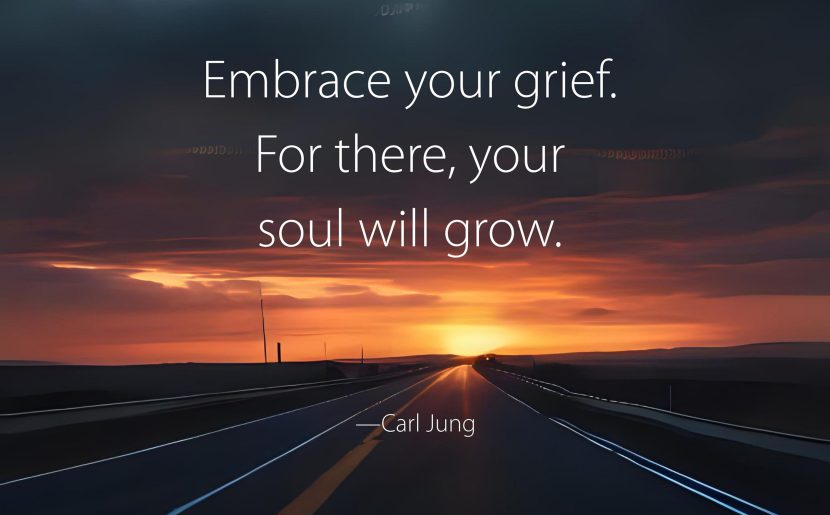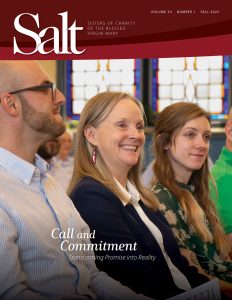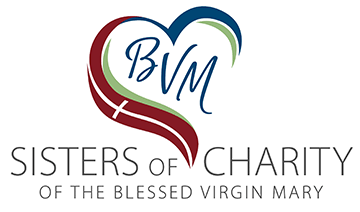Grief as Soul Work

by Katie Anders, BVM
Grief is the word we use to describe the sadness and ache we feel when we experience loss.
Losses come in many shapes and forms. Loved ones and friends die, people move away, relationships end. We lose our physical mobility, mental acuity, eyesight, and hearing. We let go of unrealized dreams or the way we thought things would be, all of which changes and shifts the landscape of our lives.
All-consuming Emotion
In her book, The Spirituality of Grief, Fran Tilton Shelton offers this definition: “Grief is an all-consuming, involuntary response—emotional, physical, social, and spiritual—to detachment from someone or something that gives a person meaning.” While the change and shift that grief brings can be named in similar ways, the experience is always unique.
We are a species that lives most of our lives thinking about what we feel rather than allowing ourselves to actually feel it. Most of us live our lives from the neck up, ignoring all that is going on throughout the rest of our body. We often avoid acknowledging our feelings because the process of recognizing our emotions can be difficult and uncomfortable. We live in a society that has created a culture where money is spent and made helping us to deny, numb, distract, or ignore our feelings, especially difficult ones.
Many of us were never taught how to acknowledge our feelings in healthy ways, yet learning to acknowledge and allow our feelings to just be what they are—to hold them gently—is the key to helping us heal and discover meaning in a loss.
Embracing Grief
Carl Jung said, “Embrace your grief, for there the soul will grow.” Learning to embrace our grief sounds impossible when the waves of sorrow are crashing over us, and yet, if we allow ourselves to enter into the process of grieving, it becomes soul work. It is a source of growth because it asks so much of us.
In our grief, there is a depth of vulnerability that is present. Most of us find vulnerability an uncomfortable feeling. As we learn to allow ourselves to become vulnerable, to feel the pain of loss and all the difficult feelings that accompany it, we can begin to know ourselves in a different way. Learning to embrace and honor these feelings is what makes the labor of grief soul work.
We learn we are capable of self-compassion and, as our self-compassion grows, so too does our compassion for others. We develop greater empathy for our friends, family, and others who are grieving. No one escapes loss, so opportunities to share our new-found compassion and empathy abound.
Embracing our grief requires a capacity to learn to stay the course rather than avoid, ignore, or push it away. Learning to stay goes against the grain of our culture. Tara Brach, a Buddhist teacher, says we are a quick-twitch culture. As soon as it’s unpleasant, we have a tendency to do whatever we can to make it go away.
Finding Gratitude Through Grief
But sometimes we need to stay in the sadness to find the gratitude, and there are times when we need to explore the grief to remember and feel the love. Just like we have the capacity to resist, we also have the capacity to learn to allow what’s really difficult—to enter into this soul work.
In his book, The Wild Edge of Sorrow, Francis Weller says, “We’re learning to become an apprentice to sorrow, because loss moves through the entire landscape of our lives.”
Loss and grief are not something we experience only once. Grief is part of the river of our life experiences. Although it may not always feel like it, we do have a choice in how we relate to it. We can choose to resist, pushing back against the current, finding ourselves continually exhausted, perhaps bitter or hard-hearted. Or we can choose to allow ourselves to move with the current and let our hearts be open to feel all of those feelings that accompany loss and know they are there because of the gift of love. When we are grieving the death of someone we care about, it hurts because we were given the gift of love.
Poet Naomi Shihab Nye says, “Before you know kindness as the deepest thing inside, you must know sorrow as the other deepest thing.”
Living, letting go, loving, grieving—they are all entangled, and we don’t get the gift of love without experiencing all of them.
Katie Anders, BVM is the Director of Spiritual Care for the Sisters of Charity, BVM in Dubuque, Iowa.
This story was featured in:
 Fall Salt 2025: Call and Commitment: Transforming Promise into Reality
Fall Salt 2025: Call and Commitment: Transforming Promise into Reality
If you would like to receive Salt, contact the Office of Development for a complimentary subscription at development@bvmsisters.org or 563-585-2864.
